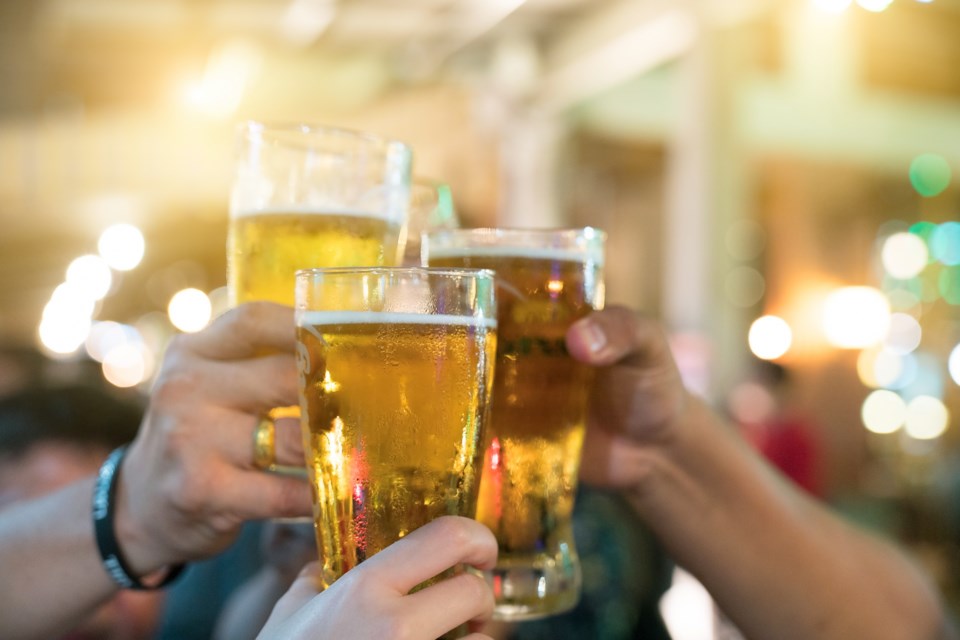This weekend marks the long-awaited return of my absolute favourite Whistler event—for my money, the jewel in our little resort’s festival crown; the day drinker’s daydream; the thirsty man’s Crankworx: The Whistler Village Beer Festival (WVBF).
On Saturday and Sunday, more than 40 breweries and cideries will fill Whistler Olympic Plaza for the WVBF’s main event, serving up a near-endless supply of craft-beer goodness, one miniature plastic cup at a time.
This little fall festival has held a special place in my heart since I first attended it in its second year in 2014. I’ve circled the date on my calendar every year since, and to see the tents dotting Whistler Olympic Plaza this weekend will bring a long-forgotten warmth to my heart (and possibly even a familiar flush to my face).
To the organizers, the festivalgoers, and the dozens of incredible breweries serving up the best of the best, I salute you—you are doing God’s work, and I will be there with you in spirit.
But the physical me won’t be attending this year.
That’s because last July, I made one of the best choices I’ve ever made, and for the past 14 months, I have been entirely alcohol-free.
I was never a horrible problem drinker, or a daily drinker (pandemic lockdown living being a worthy exception).
But I had my share of casual, alcohol-induced embarrassments, anxiety-wracked mornings, and good days of production lost to hangover sickness.
And after two decades of binge drinking, I came to the realization that alcohol was no longer adding anything to my life.
So—and at the risk of yada-yada-ing a lot of the juicy stuff here—I quit.
I won’t pretend it was easy. For many people, getting sober is the hardest thing they will ever do, and as is often noted, Whistler is a veritable minefield for the tempted.
But 14 months on, I don’t think I’ll ever drink again.
I’m not alone in this endeavour, and far from it—the rise of the “sober curious” movement has been well documented in recent years, with more people seemingly choosing to ditch the booze every day—even here in Whistler.
In an interview with Pique last week, Whistlerite and former Team Canada snowboarder Harrison Gray opened up about his own battle with addiction, and the role alcohol played in forming his identity.
“It was how I defined myself. I was Harrison the snowboarder, or Harrison the skateboarder, or Harrison the guy who could drink the most beer,” he said. “And there was always a reason to drink. Someone’s always either landed a trick, or it’s a celebration, or it’s a failure. But it’s so linked. Any contract meeting, any trip, the first stop is always the beer store.”
With this quote, Gray touches on one of the fundamental underpinnings of alcoholism; one that is constantly, almost subliminally reinforced by the world around us—the reverent weight and importance we assign to the drink; how we subconsciously allow it to dictate our every action and motivation.
It’s not this way for everyone, of course. Many people apparently have stable and healthy relationships with alcohol. If that’s you, congratulations, and carry on.
But if you’re one of the millions drowning in the depths of disillusionment, sinking ever deeper in the blackness and seeing no tract back to surface, know this: It’s OK not to drink. It can, and will, get better, if you want it to.
Alcohol is so pervasive in our culture that the thought of giving it up can be legitimately terrifying for some—like walking naked into the pub; publicly admitting yourself lesser-than; or worst of all: losing a close and (presumably) reliable friend.
Growing up in small-town Saskatchewan, alcohol was so prevalent in my upbringing and every day life that when I finally met people who had a different relationship with it, it came as a shock to me—a glimpse into an odd, untainted world I could not for the life of me understand.
Eventually, after an assortment of false starts, I found my way to that strange new world; sat down in the sunshine in awe of how much greener the grass was.
And while I won’t be attending this year’s beer festival, that’s OK, too. I’ve got tickets to the Whistler Lakes Conservation Association’s LakeKeepers event this weekend, so I’ll be limbering up my limnology muscles instead.
The old me would have felt regret over missing my favourite event on the Whistler calendar. The new me is just happy to be here. It’s a small distinction, on the face of it. In reality it represents so much more.
You may be reading this and thinking it all too personal for an opinion piece, but that’s exactly the point.
As a society, we’ve made great strides in recent years in reducing the stigma around mental health discussions.
But we can never stop having the hard conversations.
“There’s always a lot of friends that we can call to drink beer. So I’m like, ‘Why can’t we call them for a talk or to go for a coffee?’” Gray told Pique.
“And so I really want to create a space that’s open and safe for people to start discussing their issues and just chat and start changing the stigma.”
So if you’re attending this year’s WVBF, please enjoy. Drink, be merry, savour good times with friends in beautiful places.
But if you’re one of the millions who are re-examining their relationship with alcohol, it’s worth repeating:
It’s OK not to drink.
It’s OK to have hard discussions, and to be vulnerable.
And it’s not a sign of weakness to ask for help—it’s a sign of strength.




